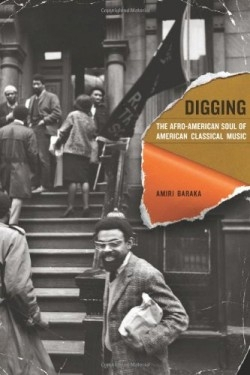
Digging
The Afro-American Soul of American Classical Music
Digging collects eighty-four essays and reviews in which the poet, playwright, and critic Amiri Baraka makes an impassioned case for jazz as a central achievement of American culture. Baraka’s 1963 book, Blues People, is a seminal work of criticism on American music, and Digging offers a generous selection of recent writing undertaken in the same spirit of intellectual engagement, political advocacy, and ardent fandom.
Although Baraka’s knowledge of American music runs deep, he eschews the dryness and reserve of academic writing in favor of livelier, more adventurous prose. Like a jazz musician reinventing a standard on the fly, Baraka constantly deconstructs and then reconstructs verbal riffs in his essays. His sentences reverberate with puns and allusions, echoing the structure and style of jazz itself. He also displays impressive intellectual range-in an essay titled “The Blues Aesthetic and the Black Aesthetic,” he makes reference to Nietzsche, Michael Jordan, and Arthur Murray as part of a single argument.
Those unfamiliar with jazz might sometimes find Digging difficult to follow. Baraka frequently refers to famous players by nicknames, and assumes an intimate familiarity with the musics history. But lovers of jazz will find much to admire in Barakas enthusiastic and insightful discussion of the music and legacies of legends like Monk, Coltrane, and Billie Holiday. He also offers perceptive takes on a number of lesser-known avant-garde and contemporary players, and ruminates in passing on performers from outside the jazz world, including Bill Cosby and Bruce Springsteen.
Baraka’s outspoken and unconventional politics might also serve as a stumbling block for some readers. Although his commitment to Marxism lends him a powerful lens for examining the socio-cultural circumstances under which jazz music has been produced, his unfortunate penchant for quoting Mao Zedong sometimes detracts from the general perceptiveness of his criticism.
At the same time, his political commitments inform the most compelling essays in the collection, in which he stresses the important role of the arts in maintaining healthy communities. In a piece on the musical culture of his hometown of Newark, he offers scathing criticism of mass media culture, while advocating the creation of “growth space for the production of local art and culture as simple confirmations that we are alive.” Communities truly thrive, Baraka convincingly argues, when their members celebrate past achievements while also engaging personally in the arts on a local level.
Disclosure: This article is not an endorsement, but a review. The publisher of this book provided free copies of the book to have their book reviewed by a professional reviewer. No fee was paid by the publisher for this review. Foreword Reviews only recommends books that we love. Foreword Magazine, Inc. is disclosing this in accordance with the Federal Trade Commission’s 16 CFR, Part 255.
